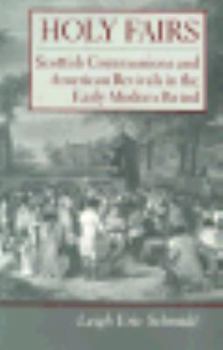Holy Fairs: Scottish Communions and American Revivals in the Early Modern Period
Select Format
Select Condition 
Book Overview
Leigh Schmidt explores the historical development of a particular Scottish religious festival, the communion season, from the Reformation to the nineteenth century, and documents its extension to colonial America and its important relationship to evangelical revivalism on both sides of the Atlantic. Held in summer or early fall and usually lasting for four days, communion occasions attracted thousands of people for a celebration of the Lord's Supper that was part holy day and part holiday. The festivals, long viewed with condescension, have been too easily ignored by scholars, but they were central to both popular Scottish Presbyterianism and early American revivalism, serving indeed as the primary basis of the camp meetings of the Great Revival. Schmidt fully interprets the rituals of these holy fairs, as Robert Burns called them, and reconstructs in detail the spirituality of the pastors and people who attended them. Finally, he suggests how they were "reformed" in the face of Enlightenment and then Victorian critiques. Schmidt brings the history of Christian worship and spirituality into conjunction with social and cultural history, anthropological approaches to ritual, histories of popular religion, and studies on ethnicity, gender issues, and material culture. This work will appeal not only to a wide range of scholars but also to general readers with an interest in the history of Christianity.
Format:Hardcover
Language:English
ISBN:069104760X
ISBN13:9780691047607
Release Date:February 1990
Publisher:Princeton University Press
Length:296 Pages
Weight:0.95 lbs.
Dimensions:1.0" x 6.5" x 9.6"
Customer Reviews
0 rating





